|
1.
CENTRAL AND WEST AFRICA
Some positive market signals
Producers report international demand remains subdued.
In the first nine months of 2023 the EU27 imported
607,300 cubic metres of tropical sawnwood, 14% less than
the same period in 2022. Imports declined from Cameroon
(-9%), Gabon (-14%), Ghana (-26%) and DRC (-4%).
In the US, imports of sawnwood in 2023 from Cameroon
dropped 43% year on year with declines also recorded for
imports from Rep. Congo (-23%) and Cote d’Ivoire (-
55%).
In early February there were signs of an awakening in
some markets. In the Middle East demand for okoume and
other light coloured species has started to pick up and just
before the Chinese New Year there were signs of growing
buyer interest in China.
There has been a resurgence in demand in China for
okoume although this is not yet reflected in export prices.
Prices remain stable for now but there is an expectation
that, if demand continues to rise, prices will follow suit.
Buyers in China have started to show renewed interest in
ayous sawnwood which may signal a shift in market
preferences and opportunities for exporters. However,
China's reduced interest in ovangkol and
bubinga/kevazingo is creating challenges for producers. In
Gabon kevazingo stocks are said to be above average.
Demand in the Philippines is said to be quiet but entering a
new phase with interest in dabema. Tali exports to
Vietnam continue at around the same volumes as towards
the end of last year. In 2023 tali imports into Vietnam
amounted to 378,200 cu.m, worth US$154.8 million,
down 32% in volume and 32% in value compared to 2022.
Sawn padouk to India
European operated mills in the region are actively
processing padouk. The top grades are shipped mainly to
Belgium while lower grades are directed to India. It is
reported that Belgium is seeing an accumulation of stock,
especially in 25mm boards and scantlings. Lower grade
padouk, even with a high percentage of sapwood, is
reportedly acceptable in India.
Mills build up log stocks
Harvesting in Gabon recently slowed as unexpected early
rains lead to some disruption of forest operations.
Cameroon's timber sector is witnessing increased
harvesting activities following a challenging period
marked by heavy rainfall. As the country welcomes a dry
period lasting until June, log stocks at mills are being
replenished as full-scale exploitation resumes.
The dry season in the northern regions of Congo adjacent
to Cameroon has facilitated expanded in harvesting
activities. However, the southern parts are still
experiencing rain.
Okoume harvesting is on the rise, but at a slower pace
than late last year and it is anticipated there may be a
downward pressure on ovangkol prices due to slow
demand in the Chinese market.
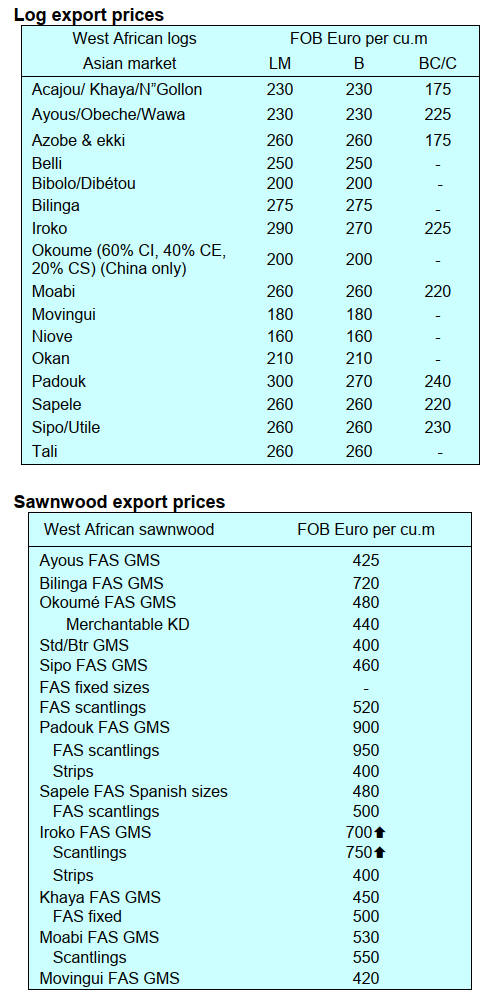
2.
GHANA
Regional markets ranked third for wood product
exports
Ghana’s wood product exports within Africa accounted for
just over 11% of all wood product exports in the first 10-
months in 2023 (249,800 cu.m) as against 14% for the
same period in 2022 (293,449cu.m) according to the
Timber Industry Development Division (TIDD). The
TIDD report shows that exports went to six major markets.
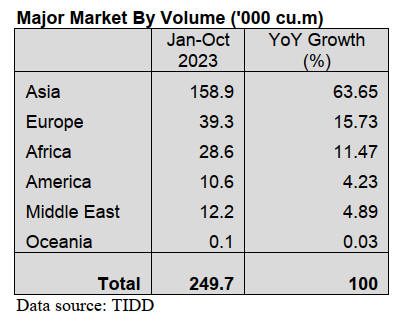
Wood product exports to Asian, European and African
markets took first, second and third positions respectively
in terms of export volumes in the first 10 months of 2023
and accounted for more than 90% of total exports in 2023
registering a drop of almost 3%. The volume exported to
the three other continents namely N.America, Middle East
and Oceania accounted for less than 10% in 2023.
For the period under consideration it was revealing to note
that, of the top market destinations, only Africa recorded a
revenue growthwhile the Asian and European markets
recorded decreases.
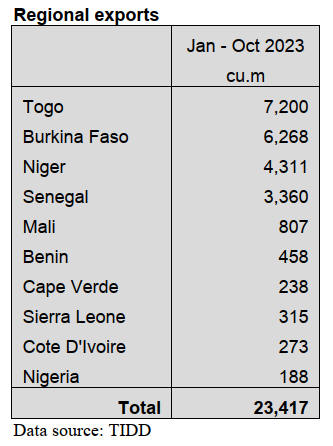
Exports to 10 ECOWAS countries contributed to Eur8.76
million from 23,417cu.m in 2023, a dip from the Eur10.38
million earned from 35,664cu.m in 2022.
However, the overall average unit price improved from
Eur291/cu.m during the period January - October 2022 to
Eur374/cu.m in the same period in 2023 representing an
increase of 28%.
The major products exported during the period reviewed
were air-dry sawnwood (58%), kiln-dried sawnwood
(13%), plywood (12%), billets (5%), rotary veneer (3%)
and mouldings (3%).
Most air-dried sawnwood was exported to India (84.5%)
and Vietnam (6.2%). The report also identified teak, ceiba,
denya and papao/apa as the leading species shipped.
Promoting the National Sustainable Forestry System
The Timber Validation Department (TVD) of the Forestry
Commission of Ghana held a workshop for government
entities to bring them up to date on the ‘Broader Market
Recognition Coalition’ (BMRC) which seeks to ensure
good forest governance in tropical timber producing
countries by promoting National Sustainable Forestry
Systems (NSFS).
The Deputy Chief Executive of the Forestry Commission,
Nyadia Sulemana Nelson, who chaired the programme,
expressed the importance of ensuring good forest
management and promotion of timber products on the
international market.
In his presentation the Director TVD, Chris Beeko,
revealed that the BMRC has already been introduced to
Ghana’s civil society organisations and the private sector.
He stated that the formation of the BMRC started at the
26th Conference of Parties (COP 26) in Glasgow. Then at
the 27th Conference of Parties (COP 27) a series of
meetings and a joint declaration on the need for BMRC
was signed by the six participating countries, Indonesia,
Guyana, Ghana, Cameroon, Liberia and Congo.
According to Mr. Beeko, this year’s Conference of Parties
(COP 28) will see the official launch of the BMRC. When
operational the BMRC will assist in securing market
access by addressing the ever-increasing trend of countries
implementing import controls. He further explained that
the BMRC promotes sustainable forestry systems, labels
and will promote approved products, promote harmonised
standards, encourage investment and facilitate
collaboration.
See:
https://fcghana.org/tvd-introduces-bmrc-to-government-entities/
Ghana Business environment challenging
The UK/Ghana Chamber of Commerce 2023 Ghana
Business Environment and Competitiveness Survey has
revealed that the number of firms that perceived the
country’s business environment as lagging behind its peers
increased to 73% in 2023 from 47% in 2022. Respondents
were of the view that other countries in the sub-region are
not struggling as much as Ghana in the aftermath of
COVID-19 or in relation to the Russian invasion of
Ukraine and its impact on global supply chains.
The report also shows that respondents in Ghana
suggested reforms, tax cuts and provision of government
incentives to promote the ease of doing business in Ghana.
See:
https://www.myjoyonline.com/72-of-firms-perceive-ghanas-business-environment-as-lagging-behind-peers-ukgcc-2023-business-competitiveness-survey/
Policy rate drops to 29%
The Monetary Policy Committee (MPC) of the Bank of
Ghana (BoG) cut the policy rate which the Central Bank
lends to commercial banks by a 100-basis point from 30%
to 29% at its first meeting of the year.
Dr. Ernest Addison, Governor of BoG, announced this to
the press after the 116th Monetary Policy Committee
(MPC) meeting in Accra. According to the Governor,
headline inflation figures declined sharply by more than
30 percentage points from 53.6% in January 2023 to 23%
in December 2023.
Dr. Addison further explained that several factors had
supported the declining inflation such as the tightening of
monetary policy throughout 2023, favourable international
crude oil prices which led to stable ex-pump prices and
transportation costs and relative stability in the exchange
rate.
Prior to the MPC meeting the Ghana National Chamber of
Commerce and Industries (GNCCI) had called for a 200%
cut on the policy rate to cushion industries from
collapsing. Because industries are faced with a multiplicity
of taxes the Association of Ghana Industries (AGI) has
been calling on government to make the business
environment conducive to prevent firms from relocating to
neighbouring countries.
See:
https://www.bog.gov.gh/wp-content/uploads/2024/01/MPC-Press-Release-January-2024.pdf
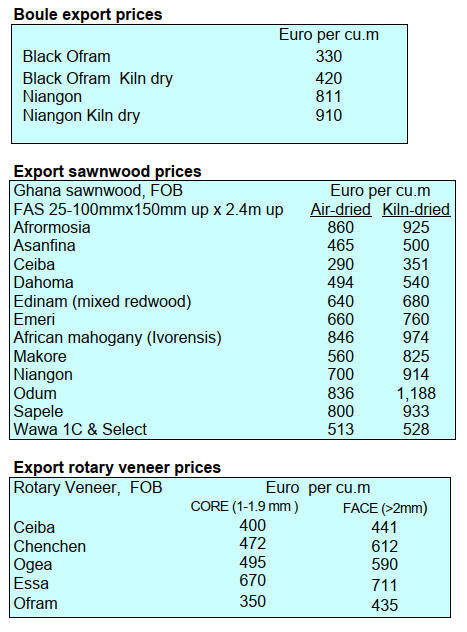
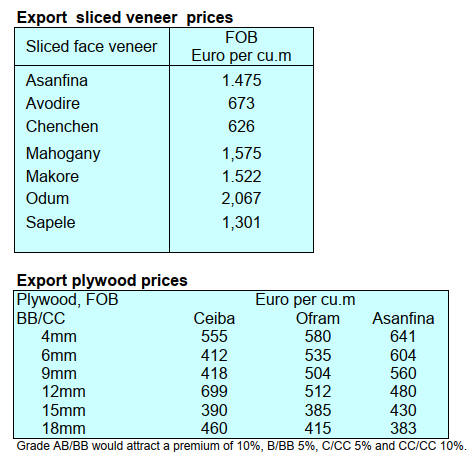
3. MALAYSIA
Lunar New Year holidays
The Lunar New Year fell on 10 February. Apart from the
official two days national holidays it is customary for mills
to take several additional days holiday which results in
lower production during the month.
Freeze on foreign worker applications
The government is extending the freeze on new
applications for recruitment of foreign workers. This is
because the existing quota, along with the number of
foreign workers to be legalised under a recalibration
programme, is considered adequate to satisfy the demand
for foreign labour according to the Minister of Home
Affairs.
The duration of this quota freeze has not yet been
announced. The timber industry, like many other
industries, is dependent on foreign workers.
Employers have been given three months until the end of
March to complete the legalisation process for their
foreign employees. Of the 15 foreign labour source
countries three countries are prioritised, Indonesia, Nepal,
and Bangladesh which collectively provide 77% of
Malaysia’s foreign labour.
See:
https://ceomorningbrief.theedgemalaysia.com/article/2024/0711/Home/3/699356
More on Sarawak/Japan SFM collaboration
The Sarawak government, represented by Forest
Department, has signed an agreement with the National
Institute for Environmental Studies (NIES) Japan. The
signing was held during a symposium entitled ‘Bilateral
Collaboration Research Towards Sustainable Forest
Management (SFM) in Sarawak’.
Following an MoU entered and exchanged in Tsukuba,
Japan in the December 2023 between the Forest
Department Sarawak (FDS) and NIES Japan the FDS
headquarters in Kuching received an official visit from
NIES researchers.
The MoA is to regulate research activities and obligations
of the parties for the purpose of consultancy services on
Forest Volume Modelling Using UAV Derived Metrics
and Permanent Sample Plot.
See:
http://theborneopost.pressreader.com/article/281603835353017
Panel Association visits Sarawak plantations
As reported in the previous Tropical Timber Market
Report (Vol.28 No.2), Malaysian Panel-Products
Manufacturers Association (MPMA) and the Sarawak
Timber Industry Development Corp (STIDC) signed a
memorandum to promote collaboration and knowledge
exchange on sustainable planted forests management.
As part of that agreement, STIDC hosted a field visit for
MPMA delegates to showcase the Licence for Planted
Forests (LPF/0043) project’s best practices in planted
forest management. MPMA chairman Sheikh Othman
Rahman expressed his enthusiasm for the LPF/0043
project, calling it MPMA’s best option in terms of tropical
trees for timber industry product manufacturing.
See:
https://www.theborneopost.com/2024/01/25/stidc-showcases-planted-forest-best-practices-to-panel-manufacturers/
Sabah Biomass Industry Policy
The Sabah State Cabinet has approved an Oil Palm
Biomass Industry Policy and also decided to impose a
State Sales Tax on biomass exports pending the
implementation of the policy. The aim of the policy is to
control exports of biomass.
The policy will be enforced within two years from the date
of its approval (after the palm oil industrial cluster (POIC)
Sabah Biomass Collection Platform is fully operational)
and under the purview of the State Industrial Development
and Entrepreneurship Ministry.
See:
https://www.theborneopost.com/2024/02/07/cabinet-approves-oil-palm-biomass-industry-policy/
Furniture fair
MIFF 2024 is set to be larger than before. MIFF has
become influential place in Southeast Asia when it comes
to sourcing furniture, furniture accessories, fittings,
materials and hardware.
Exhibitors and buyers are expected from Australia,
Cambodia, China, India, Indonesia, Hong Kong, Japan,
South Korea, Taiwan P.o.C, Thailand, Turkey, Vietnam,
UAE the EU and the USA. MIFF 2024 promises to bring
the best offerings from the furniture market.
For registration details see:
https://miff.com.my/register-now/?cid=edm310124intlexh
4.
INDONESIA
The following is a list of wood HPE prices
effective 1-29
February 2024.
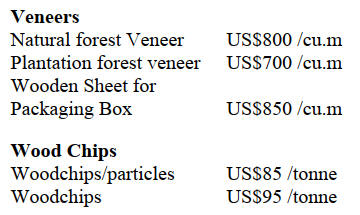
Processed Wood
Processed wood products which are leveled on all four
sides so that the surface becomes even and smooth with
the provisions of a cross-sectional area of 1000 to 4000 sq.
mm (ex 4407.11.00 to ex 4407.99.90)
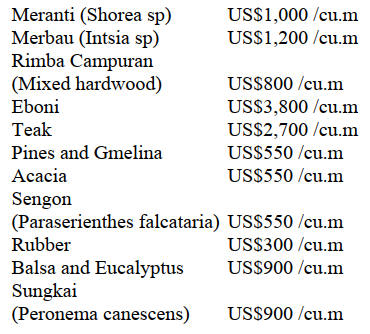
Processed wood products which are leveled on all
four
sides so that the surface becomes even and smooth with
the provisions of a cross-sectional area of 4000 to 10000
sq.mm (ex 4407.11.00 to ex 4407.99.90)

Processed wood products which are leveled on all
four
sides so that the surface becomes even and smooth with
the provisions of a cross-sectional area of 10000 to
15000sq. mm (ex 4407.11.00 to ex 4407.99.90)

See:
https://jdih.kemendag.go.id/pdf/Regulasi/2024/141_Kepmendag%20HPE%20dan%20HR%20Produk%20Pertanian%20dan%20Kehutanan%20Januari%202024%20+%20lampiran.pdf
Five strategies to boost the furniture industry
Director General of Agro Industry at the Ministry of
Industry, Putu Juli Ardika, said Indonesia still has great
opportunities to develop the furniture sector because it is
supported by the abundant availability of raw materials.
Among them are various types of wood including meranti,
teak, mahogany and acacia. Efforts to downstream or
increase the added value to natural resources need to
continue to be encouraged to boost national economic
growth.
Putu Juli Ardika said the Ministry of Industry is focused
on implementing five strategic policies in an effort to
develop a furniture industry that can be globally
competitive.
These five steps include facilitating the availability of raw
materials, facilitating the availability of skilled human
resources, facilitating market improvement and
strengthening market reference research, facilitating
increased productivity, capacity and product quality as
well as facilitating a conducive business climate and
increasing investment.
See:
https://industri.kontan.co.id/news/kemenperin-ungkap-sejumlah-strategi-mengangkat-kinerja-industri-furnitur#google_vignette
Government incentives for wood processing
machines, entrepreneurs seek more
The Indonesian Furniture and Crafts Industry Association
(HIMKI) asked the government to increase the budget
ceiling for the machine restructuring programme to
enhance their productivity and production capacity. In
2023, the Ministry of Industry distributed almost IDR10
billion for advanced machinery used by 15 domestic
companies.
HIMKI General Chair, Abdul Sobur, stated that the
programme had been proven to assist furniture industry
entrepreneurs in enhancing efficiency, capacity, work
productivity and product quality. Sobur added that the
budget ceiling for the machine and/or equipment
restructuring programme for the wood processing industry
in the 2024 fiscal year is IDR7.8 billion.
We urge the government to maintain the programme and
increase the budget limit so that more companies can
benefit from this assistance, he stated.
See:
https://ekonomi.bisnis.com/read/20240126/257/1735795/pemerintah-beri-insentif-mesin-olahan-kayu-pengusaha-minta-tambah
IFEX 2024 - 68 countries registered
IFEX (Indonesia International Furniture Expo) will be
held 29 February to 3 March 2024 at the JIExpo,
Kemayoran in collaboration with Dyandra Promoslndo.
Abdul Sobur, General Chairman of HIMKI said this 9th
IFEX event enables local producers to connect with buyers
from around the world which is a great advantage.
The Fair serves as a platform for local producers to
showcase their products to the global market. At this 9th
event, IFEX raised the theme R.E.A.L, which stands for
Reflection on Culture, Experiencing the Comfort,
Adapting to Sustainability and Leading the Innovation.
This upcoming event will feature more than 500 exhibiting
companies, including companies that have adapted to
sustainability, and showcasing more than 1,000 products
from various parts of the world with various raw materials
such as wood, rattan, bamboo, leather, fabrics, arts and
craft and pottery.
See:
https://www.pantau.com/nasional/195289/ifex-2024-dorong-ekspor-indonesia-melalui-pameran-mebel-dan-kerajinan-berkualitas-internasional
Wood coating from keruing (Dipterocarpus sp) oil
residue
The Biomass and Bioproduct Research Center under the
National Research and Innovation Agency (BRIN) is
researching the potential of keruing tree oil residue for
processing into a wood coating resin that is
environmentally friendly.
Head of the BRIN Biomass and Bioproduct Research
Center Akbar, Hanif Dawam, said the chemical
component of keruing oil contains β-bisabolene (C15H24)
which is isolated from Commiphora guidottii oil contains
compounds from the phthalic acid group.
See:
https://www.antaranews.com/berita/3949278/brin-kembangkan-resin-pelapis-kayu-berbahan-residu-minyak-keruing
Banjarnegara offers excellent opportunities for
investors
Banjarnegara Regency is considered to have a high
potential for investment in the wood processing sector.
The reason is that there is an albasia community forest
area with a five-year timber harvest cycle in the
surrounding area.
During a visit to the PT Cebong Albasindo, a wood
processing factory on the border of Banjarnegara and
Wonosobo Regencies in Central Java, the Chairman of the
People's Consultative Assembly (MPR), Bambang
Soesatyo (Bamsoet), expressed his support for increasing
the productivity of the wood processing industry in the
region.
According to him, the wood processing industry in
Banjarnegara has immense growth potential. Investors,
both domestic and foreign, are welcome to explore the
opportunities. The Albasia wood produced in
Banjarnegara is known for its superior quality and it can
be harvested within five years of planting.
See:
https://forestinsights.id/industri-kayu-di-banjarnegara-potensial-peluang-bagi-investor/
Forestry multi-businesses optimise benefits
At a Forestry Forum organised by the Indonesian Chamber
of Commerce and Industry (KADIN) and the Association
of Indonesian Forest Concession Holders (APHI), Acting
Director General of Sustainable Forest Management, Agus
Justianto,said the Ministry of Environment and Forestry is
promoting Forestry Multi-businesses (MUK) in Forest
Utilisation Business Permits (PBPH) areas.
This is because implementation will provide optimal
benefits from technical, production, social and economic
aspects.
Agus also said that Forestry multi-business is supporting
the achievement of the 2030 FOLU Net Sink target.
Meanwhile, the Deputy General Chair of APHI, Dr.
Soewarso, explained that to encourage the implementation
of Forestry Multi-business, KADIN together with APHI
implemented the Regenerative Forest Business Hub
platform.
See:
https://agroindonesia.co.id/kadin-aphi-gelar-forestry-forum-dorong-implementasi-multi-usaha-kehutanan/
Indonesia/US effort to lower sector emissions
The governments of Indonesia and the United States have
agreed to work together to reduce greenhouse gas
emissions generated by the forestry sector by supporting
Indonesia's Forestry and Other Land Uses (FOLU) Net
Sink 2030 plan.
According to the Environment and Forestry (LHK)
Ministry, the agreement was marked by the signing of a
memorandum of understanding (MoU) between LHK
Minister Siti Nurbaya Bakar and Forest Service Chief at
the US Department of Agriculture, Randy Moore, in
Jakarta on Tuesday.
See:
https://en.antaranews.com/news/303819/indonesia-us-team-up-to-lower-forestry-sector-emissions
In related news during a working visit to Central
Kalimantan the United States Forest Service (USFS) took
an interest in Indonesia's community-based forest
management practices. USFS Head Randy Moore said he
was impressed with what Indonesia is achieving with
community and social forestry.
See:
https://www.infopublik.id/kategori/nasional-sosial-budaya/820216/usfs-kagumi-hutan-sosial-dan-penanganan-karhutla-indonesia
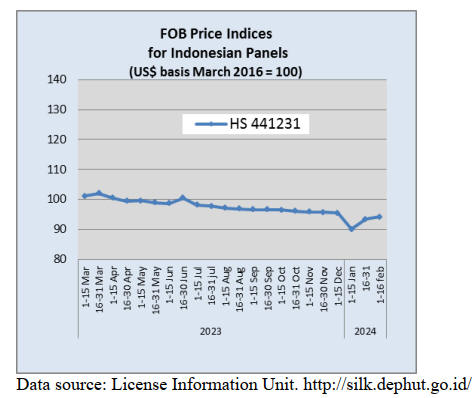
5.
MYANMAR
MTE introduces new grade of teak logs
The Myanma Timber Enterprise (MTE) is currently
offering approximately 500 tons of teak logs in Grades
SG-5, 6, 7, PTG-1, 2, 3 and PTP (Plantation Teak Pole) in
the monthly tenders. While the publication of Tender
Results is pending it has been observed that prices are
declining with some lots remaining unbid.
As of December 2023 a new grade, MIX Quality, has been
introduced primarily encompassing confiscated logs of
varying origin. 246 tons of MIX Quality were mentioned
in the December 2023 Tender.
The status of products from these logs is unclear as the
Ministry issued an order in November 2016 prohibiting
the export of confiscated timber. There has been no
official statement on whether the MIX Quality logs will be
allowed for export.
MTE typically issues Certified Letters for other grades
providing essential harvesting details such as the
Extraction Agency, Forest Administration
District/Township, Forest Type, Extraction Year, Species,
Entry Permit to Forest, Revenue Mark and Production
Depot.
This document was highly sought after by buyers in the
EU and USA prior to the trade suspension imposed during
2021-2022 as a result of sanctions against MTE. It has
been observed that the Certified Letter will not be
available for the products milled from MIX Quality logs.
Singapore the top investor
The domestic media (ELEVEN) has reported that Dr. Wa
Wa Maung, Deputy Minister in the Ministry of Investment
and Foreign Trade Communications, disclosed that in
February 2023 the highest inflow of foreign investments
into Myanmar originated in Singapore followed by China
and Japan.
The industrial and service sectors attracted the largest
investments with Singapore leading at US$346 million,
trailed by China at US$236 million and Japan at US$99
million.
Over the past three years both trade volumes and foreign
investment have declined. A comparison between fiscal
year 2019-20, during the civilian government and fiscal
year 2022-23, the inaugural full fiscal year under the
military junta reveals a significant decrease in foreign
investment.
Conscription announced
The State media has reported mandatory military service
for all young men and women. All men aged 18-35 and
women aged 18-27 must serve for up to two years while
specialists, such as doctors aged up to 45, must serve for
three years. The service can be extended to a total of five
years in the ongoing state of emergency.
See:
https://www3.nhk.or.jp/nhkworld/en/news/20240211_10/
6.
INDIA
Veneer and plywood price
indices rise
The annual rate of inflation based on all India Wholesale
Price Index was 0.73% in December 2023 (over December
2022). The positive rate of inflation in December 2023
was primarily due to increase in prices of food, machinery
and equipment, transport equipment and electronics and
optical products.
The index for manufactured products dropped to 140.1 in
December 2023 from 140.4 for November. Out of the 22
NIC two-digit groups for manufactured products, 15
groups saw price increases whereas 7 groups witnessed a
decrease.
The price inidex for wood veneers rose in December
creating a knock-on effect on panel prices. In December
the price index for sawnwood dropped, marking the
second month of decline.
See:
https://eaindustry.nic.in/pdf_files/cmonthly.pdf
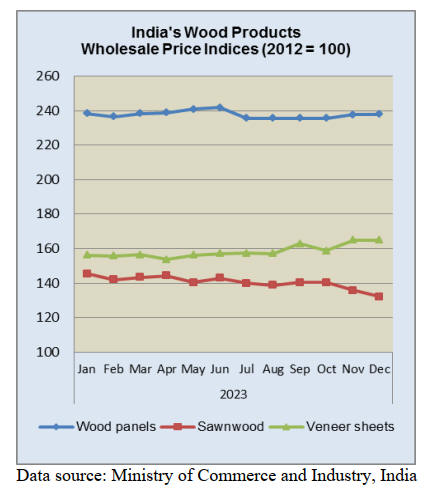
Market overview
The ITTO correspondent reports markets are quite slow at
present as the deadline for meeting the new Standards
requirements for imports of semi-finished and finished
products is approaching. The new requirements came into
force for MDF and particleboard on 9 February whereas
the effective date for plywood, decorative plywood and
other products is 29 February.
The majority of importers have either frozen or cancelled
outstanding orders as there has been no announcement of
an extension for applying BIS certification. The new
regulations not only impacst importers but also the
thousands of ‘un-organised‘ manufacturers in India. These
are facing considerable difficulties in meeting the new
requirements. Also there has been no guidance on how
importers, stockists or manufacturers should deal with
existing stocks.
The good news from imports is that the exchange rate,
ocean freight and other logistics are stable.
Federation recommends duty reductions for wood raw
materials
The Federation of Indian Plywood and Panel Industry
(FIPPI) has made several recommendations to the Finance
Ministry and Department of Promotion of Industry and
Internal Trade under the Commerce and Industry Ministry
which it considers would boost the plywood and panel
sectors. The Union Budget presented on 1 February 2024
is viewed by industry as an interim budget with no major
policy decisions on revision of customs duty, income-tax
etc. It is expected that, after the upcoming elections, a
revised budget will be presented.
The FIPPI currently represents around 3,300 small,
medium and large manufacturers directly supporting
around 1 million households and almost same number
indirectly. The wood panel market in India is estimated to
be valued at US$30 billion annually and over the last five
years the segment has seen a CAGR of 6-7%.
Almost 92% of the wood raw material used by these
industries is sourced from Trees Outside Forest /private
Agro-forestry.
An estimated 1 million farmers are engaged in TOF/Agro-
forestry plantation production suppling raw material to
the plywood, wood based panel and paper industries. To
sustain this vital Agro-Forestry production it has been
suggested to the government that efforts are needed to
integrate log production with wood based industries.
The wood based industries depend extensively on these
domestic raw material producers and are sustaining
support to farmers and other log producers through
remunerative prices for their logs. The FIPPI
recommendations to the government include the
following:
HS Code: 4403 - reduce the basic import duty on
timber imports to 0% from 5%
HS Code: 4407 - reduce the basic import duty on
sawn timber to 0% from 10%
HS Code: 4408 - reduce the basic import duty to
0% from 10% on face veneers used for
manufacturing plywood.
To increase import the duty by 2.5 to 3 times for
finished products such as particleboard, MDF,
plywood, fancy plywood and veneered decorative
plywood that fall under HS Code 4410 to 4421
from 10% to 25 to 30%
The correspondent concludes saying “the government and
manufacturers are trying to fulfil the Prime Minister’s aim
of the self-reliance/make in India project so all the new
regulations, such as from the Bureau of Indian Standards
and recommendations made by the FIPPI to increase
import duty on semi-finished and finished products will
support the aim of the government.
At the same time the recommended changes will not affect
those sectors which are dependent on imported raw
material”.
National certification an alternative to foreighn schmes
The Indian Forest and Wood Certification Scheme
(IFWCS) will offer an alternative to the private foreign
certification agencies that have been operating in the
Indian market for the last two decades.
The IFWCS intends to offer SFM certification for Trees
Outside Forests similar to that for plantations including a
chain of custody system to guarantee the traceability of
timber along the supply chain. The launch of the
certification comes as new Standards for forest
management will be mandatory for all forest divisions in
the country.
Existing forest working plans have been updated to meet
the newly-developed Indian Forest Management Standards
that contain eight criteria, 69 indicators and 254 verifiers.
These standards will be mandatory for all forest divisions
in the country to implement.
See:
https://indianexpress.com/article/india/centre-launches-forest-certification-scheme-to-counter-foreign-agencies-9073713/
7% GDP growth for next fiscal year
After a three-day Reserve Bank of India meeting Govenor
Shaktikanta Das said the Bank projects gross domestic
product for the coming financial year at 7% as the Indian
economy is making progress on a strong, sustained and
transformative growth path.
On retail inflation, Das said the forecast is for 4.5% for the
coming financial year assuming normal monsoon rains.
That would be above the central bank's medium-term
target of 4%. Das maintained the 5.4% projection for the
current year is within the RBI's tolerance band of 2% to
6%.
See:
https://www.rbi.org.in/Scripts/BS_PressReleaseDisplay.aspx?prid=57280
IMF and India at odds over management of the rupee
In a recent press release the IMF says India has intervened
excessively in the currency market a claim India denies.
The IMF annual report on India's economic situation,
covering the period from December 2022 to October 2023,
analyzed economic and financial conditions.
The report praised India saying, "Growth is expected to
remain strong, supported by macroeconomic and financial
stability, headline inflation has moderated and the strength
of India's economic fundamentals was sound.
Against this background it came as a surprise that the
Fund suggested India had shifted from a floating exchange
rate regime, in which the rupee's movements had been left
to the market, to a managed regime, in which the country
controlled the exchange rate.
It also said India had intervened in selling dollars more
than it deemed necessary.
In a response the Reserve Bank of India said the IMF's
characterisation of India's exchange rate as a "stabilised"
rather than floating was incorrect and inconsistent with
reality and said it "strongly disagreed with IMF
assessment.
See:
file:///C:/Users/Owner/Downloads/1INDEA2023001.pdf
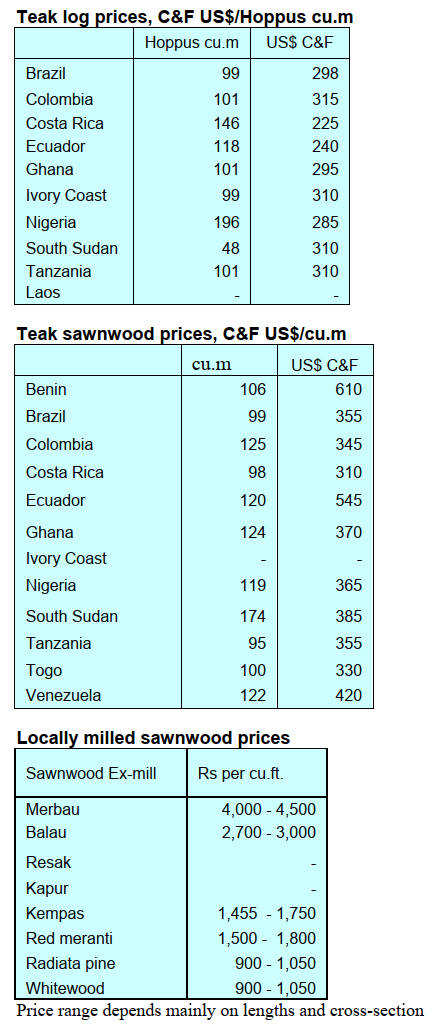
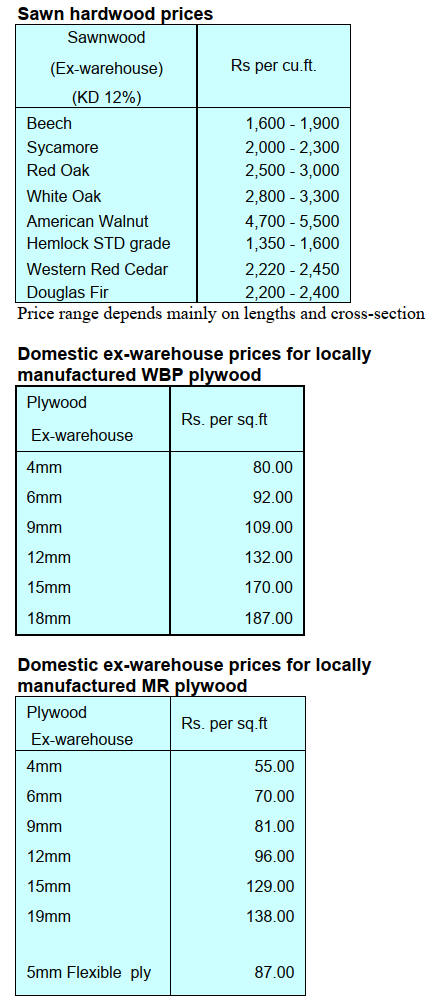
7.
VIETNAM
Wood and Wood Product (W&WP) trade highlights
In January 2024 W&WP exports are forecast to be worth
US$1.25 billion, down almost 7% compared to December
2023 but up 55% compared to January 2023. In particular,
WP exports contributed US$889 million, down 7%
compared to December 2023 but up 81% compared to
January 2023. The high difference of export turnovers in
January 2024 against that of January 2023 is explained
mainly by the Lunar Year holidays slowing export
transactions in January last year.
Imports of logs and sawnwood in December 2023
amounted to 370,800 cu.m, worth US$121.6 million,
down 12% in volume and 12% in value compared to
November 2023.
Compared to December 2022 imports decreased by 16%
in volume and 23% in value. Overall, in 2023 Vietnam
imported 4,440 million cu.m of logs and sawnwood at a
value of US$1.506 billion, down 26% in volume and 34%
in value compared to 2022.
It is estimated that in January 2024 exports of wood and
wood products will reach US$1.4 billion, up 5% compared
to December 2023 and up 75% compared to January 2023.
In particular, the export of wood products is estimated at
US$924 million, down 3% compared to December 2023
but up 87% compared to January 2023.
In January 2024, wooden furniture exports were valued at
US$884 million, up 5% compared to December 2023 and
double that in January 2023.
W&WP exports to the EU market in January 2024 earned
about US$63 million, down 6% compared to December
2023 but up 5% compared to January 2023.
W&WP exports to the US in January 2024 earned US$781
million, up 5% compared to December 2023 and up 15%
compared to January 2023.
Pine imports in December 2023 were at 45,900 cu.m
worth US$10.5 million, down 37% in volume and 35% in
value compared to November 2023. However, compared
to December 2022, imports increased by 21% in volume
and 13% in value.
Overall in 2023, pine imports reached 705,400 cu.m,
worth US$155.0 million, down 24% in volume and 39% in
value compared to 2022.
Vietnam's imports of poplar wood in December 2023 were
recorded at 2,900 cu.m, worth US$10.3 million, down
0.7% in volume and 10% in value compared to November
2023. Compared to December 2022 imports rose by 39%
in volume and 29% in value. Overall, in 2023, poplar
imports totalled 323,700 cu.m, worth US$130.6 million,
down 12% in volume and 27% in value compared to 2022.
In 2023 imports of logs and sawnwood from the US
reached 522,010 cu.m at a value of US$223.62 million,
down 24% in volume and 32% in value compared to 2022.
Imports of logs and sawnwood from Africa in December
2023 amounted to 45,020 cu.m, at a value of US$17.47
million, down 30% in both volume and value compared to
November 2023 and down 69% in volume and 67% in
value compared to December 2022.
Overall, in 2023, imports of raw wood from Africa were
720,060 cu.m, at a value of US$281.81 million, down 46%
in volume and 43% in value compared to 2022.
Vietnam's NTFP exports in December 2023 reached the
highest level over the past 20 months at US$71.35 million,
up 9.3% compared to November 2023 and up 6.7%
compared to December 2022. In 2023, Vietnam's NTFP
exports earned US$733.26 million, down 10% compared
to 2022.
Over US$50 million from first forest carbon sale
2023 marked a significant milestone for the forestry sector
as Vietnam successfully sold 10.3 million forest carbon
credits (10.3 million tonnes of CO2) for the first time
through the World Bank for US$51.5 million according to
the Deputy Minister of Agriculture and Rural
Development, Nguyen Quoc Tri.
The sale was part of the Emission Reductions Payment
Agreements (ERPA) in the North Central Region signed in
2020 between the International Bank for Reconstruction
and Development (IBRD) and the Ministry of Agriculture
and Rural Development.
In early August 2023, the World Bank paid the first ERPA
instalment of US$41.2 million, the balance will be paid
after the transfer of the carbon credits.
The Vietnam Forest Protection and Development Fund has
received and disbursed all of the first payment so that six
north central provinces can make payment plans to forest
owners.
In addition to the number of credits sold, the Bank has
confirmed the emission reduction results of the entire
North Central Region for the period January 2018 -
December 2019 amounts to 16.21 million tonnes of CO2
(equivalent to 16.21 million credits).
Deputy Minister Tri said that 2023 was a tough year for
the forestry industry because of supply and demand chain
disruptions, logistics problems, and bad weather
conditions. However, he acknowledged the sector's efforts
to overcome difficulties in the past year to achieve
remarkable results.
According to the Vietnam Administration of Forestry, the
country planted about 250,000 hectares last year,
surpassing the yearly plan by 2%. The forest coverage rate
was 42.02%, matching the target. The total revenue from
all forest environmental services reached more than
US$169 million .
See: Vietnam earns 51.5 million USD from first forest carbon credit sale (dangcongsan.vn)
8. BRAZIL
Amazon Fund secured major
investment in 2023
The Amazon Fund, which resumed activities last year after
four years without funding, received R$726 million in
2023 from partner countries. This was the highest amount
since 2009 (R$1.9 billion).
The main contributions came from the United Kingdom
(R$497 million), Germany (R$186 million), Switzerland
(R$28 million) and the United States (R$15 million). In
addition, there were R$3.1 billion in contributions pledged
for the coming years, especially from the United States
(R$2.4 billion).
The fund, created in 2008 and administered by the
National Bank for Economic and Social Development
(BNDES), supports projects to monitor the forest, combat
deforestation and sustainable development in the Amazon
region.
In its 16 years of existence, it has already invested R$1.8
billion in more than 100 sustainable production projects
benefiting hundreds of thousands of people as well as
secured indigenous lands and conservation units.
See:
https://forestnews.com.br/fundo-amazonia-capta-r-726-mi-em-2023/
Sustainability of Mato Grosso's forestry sector
A consortium of forestry unions in the State of Mato
Grosso representing more than 500 companies in around
half of the State municipalities is leading efforts to
strengthen the forest-based sector.
At a recent gathering possible solutions to strengthen the
sector were discussed with emphasis on extending the
validity of the logging permit (Autorização de Exploração
Florestal - Autex)(from 12 to 24 months and adjustments
to the environmental licensing system. The attendance of
the Mato Grosso State Environment Secretariat (Sema) at
these meetings was crucial to advise on compliance with
regulations and provide guidance on licensing and trade in
forest products.
See:
https://simenorte.com.br/noticias/cipem-atua-pela-sustentabilidade-do-setor-de-base-florestal-de-mato-grosso/
Pará exports fell in 2023
The timber sector in the State of Pará, a major timber
exporter in the Amazon Region, witnessed a significant
drop in exports in 2023 with a 39% reduction in the
volume of wood shipped compared to the previous year.
The Association of Timber Exporting Industries of the
State of Pará (AIMEX) reports that the drop can be
attributed mainly to the decline in wood product prices on
the international market and global conflicts that have
disrupted supply chains.
Despite the challenges, the United States remained the
main market for timber exports from Pará, accounting for
30% of all shipments while the European Union also had a
significant share of 45% of all timber shipped by the Pará
State, especially for products such as flooring, decking and
sawnwood. AIMEX also points out a growth in exports of
plantation teak log with India emerging as the main
destination.
See:
https://forestnews.com.br/xportacoes-de-madeira-no-para-recuam-39-em-2023/
Brazilian furniture makers do well at Fair
During the IMM Cologne 2024 International trade fair
held in Germany, the companies taking part in the
Brazilian Furniture Sector Project achieved a significant
milestone by generating a total of US$35.0 million in
closed and projected business deals.
With over 80% of these contracts representing new
commercial opportunities the event demonstrated the
growing demand for Brazilian products that combine
advanced processing technologies, sustainability,
innovative design and creative authenticity.
The participation of 26 Brazilian furniture industries,
including 13 companies that exhibited their products on
exclusive stands, demonstrates the sector's commitment
and competence in seeking international business
opportunities.
Under the leadership of ABIMÓVEL, in collaboration
with ApexBrasil, the Brazillian Furniture Sector Project,
continues to strengthen the status and competitiveness of
the Brazilian furniture industry in international markets.
See:
https://forestnews.com.br/brazilian-furniture-35-mi-negocios-imm-cologne/
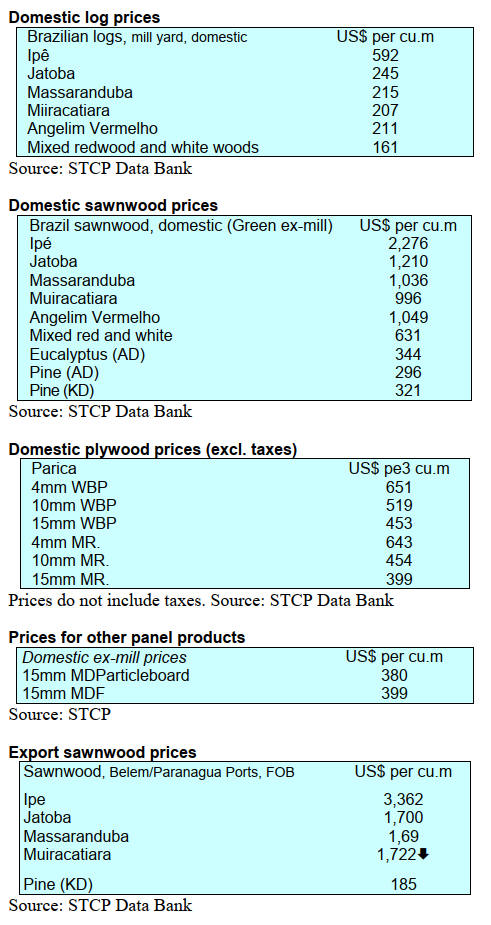
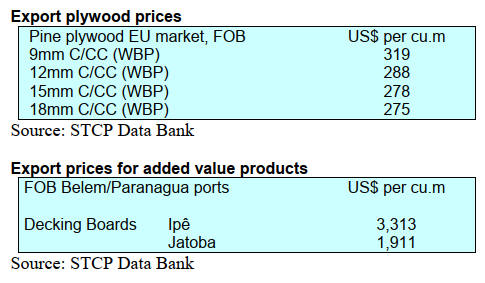
9. PERU
2023 exports – China and
Mexico imported less
The Extractive Services and Industries Management of the
Association of Exporters (ADEX) has reported wood
product exports in the first 10 months of 2023 totalled
US$92.6 million, a drop of 22% compared to the same
period in 2022.
This contraction is explained by lower orders from the two
main buyers, China (US$18.6 million) and Mexico
(US$12.9 million), which declined by 19 and 14%,
respectively. Regarding China, the global real estate sector
is facing a severe crisis which has undermined demand for
wood products.
Other market destinations were France (US$12.8 million)
with a share of 14% of total shipment, the Dominican
Republic (US$10.6 million) also with a share of 14% and
the United States (US$ 8.8 million) with a share of 9.5%.
According to figures from the ADEX Data Trade
Commercial Intelligence System, sawnwood was the main
product exported in 2023 earning US$9.1 million despite
having contracted by 17% compared to the previous year.
Second in the ranking of export products were semi-
manufactured goods that reached US$31.8 million, but this
was down 40% year on year. Other products were
construction products (US$5.1 million), firewood and
charcoal (US$4.9 million) and manufactured products
(US$4.1 million).
Technical assistance to native communities
The National Forestry and Wildlife Service (Serfor)
provided technical assistance to around 100 native
communities in Loreto, Amazonas and Ucayali on
preparation of Management Declarations (DEMA) which
are required for the sustainable use of aguaje, pijuayo,
shiringa, cat's claw and pali blood all of which will
generate economic income for the Amazonian populations.
Thanks to the technical assistance in the communal
forests, it was possible to harvest and process more than 8
million board feet of wood as well as more than 3 million
kilos of aguaje, 40,000 kilos of pijuayo, 19,000 kilos of
cat's claw or uña de gato, 20,000 litres of shiringa/latex
and more than 2,000 litres of pali blood wood (Sangre
brosimum) which will enter the market legally.
The DEMA are now being evaluated and then will come
the visual inspection, the issuance of the resolution that
grants the exploitation permits and the creation of the
Forestry and Wildlife Surveillance Committe, explained
the Director of Sustainable Management of Forest
Heritage.
It was reported that after this pilot project it is
expected
that technical assistance can continue to around 500
communities in the Amazonian and Andean Departments.
Empowerment of women in forest management
Under the principle of equality and empowerment, the
Forestry and Wildlife Resources Supervision Agency
(OSINFOR) led an initiative to promote and make visible
the role of women in the forestry sector through three
workshops in the regions of Madre de God and Piura.
During the workshops crucial topics were addressed that
highlighted the participation of women in productive
activities, their irreplaceable contribution to forest
conservation and the experiences and fundamental role
they play in the conservation of forests was explored.
The focus of the workshops was to raise awareness on the
importance of women in the preservation of biodiversity,
share inspiring experiences, empower more women in
decision-making and encourage the adoption of good
practices to promote sustainability in management of
natural resources.
See:
https://www.gob.pe/institucion/osinfor/noticias/881674-mujeres-al-frente-osinfor-lidera-talleres-para-el-empoderamiento-femenino-en-la-gestion-forestal
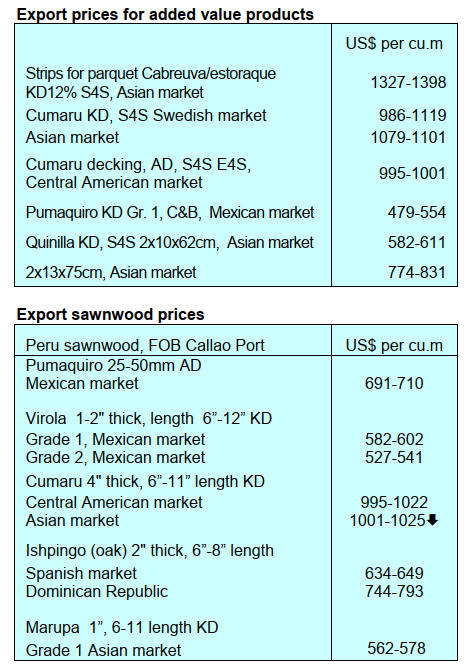
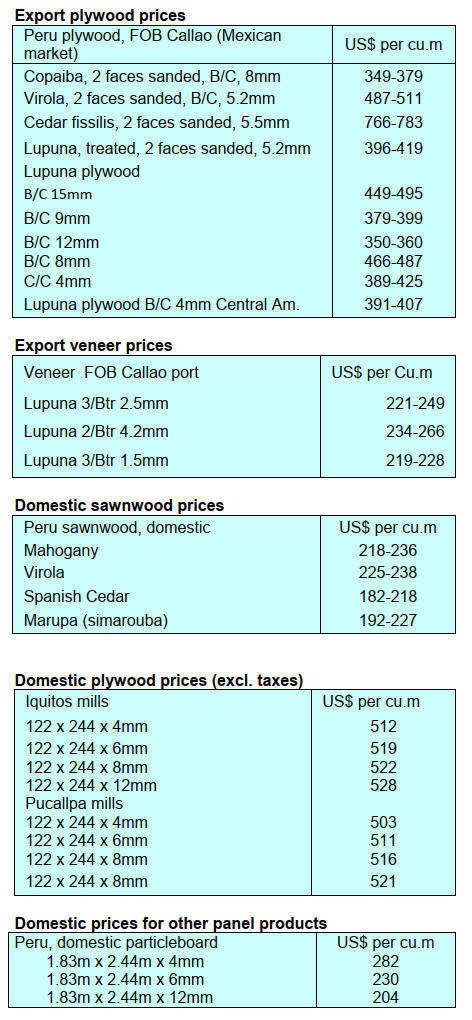
|